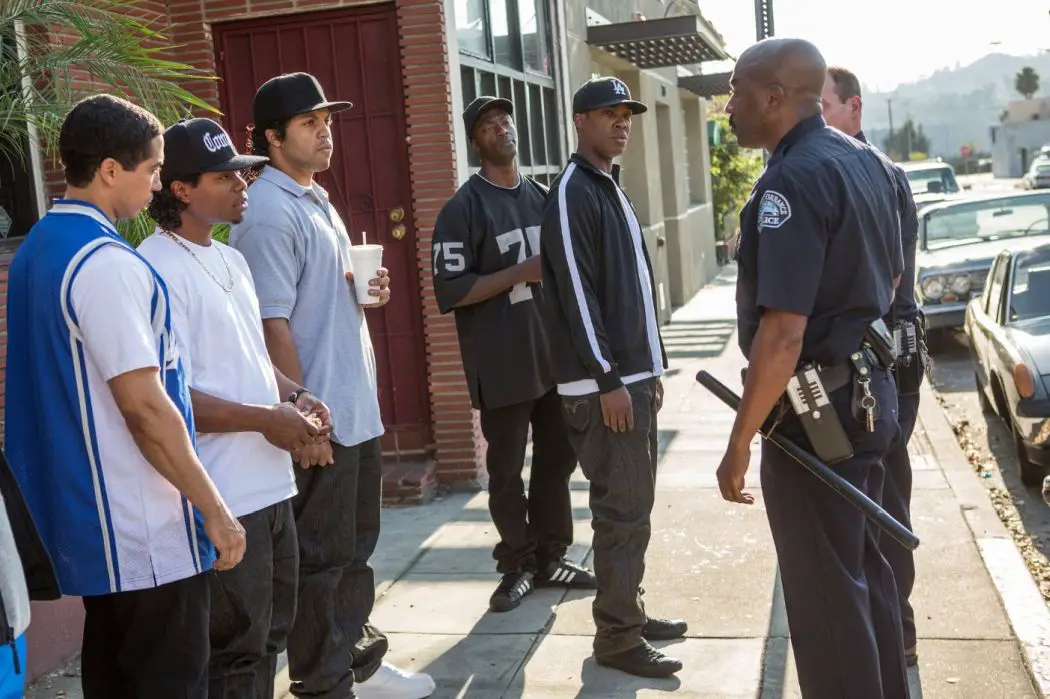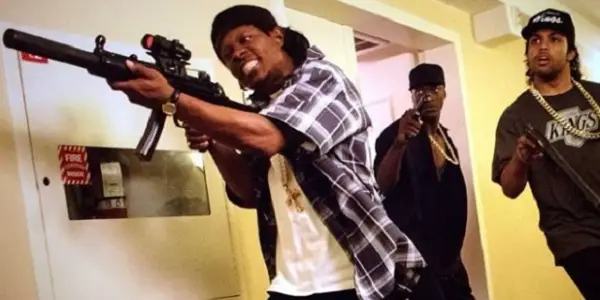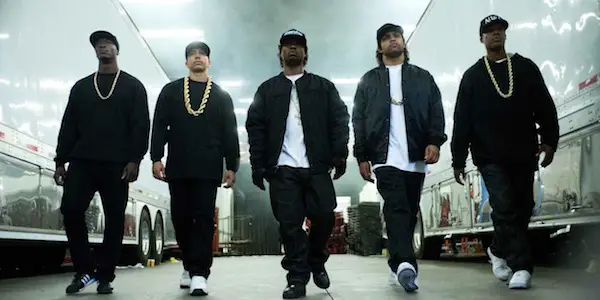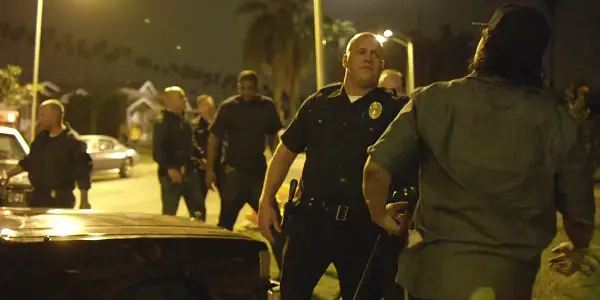STRAIGHT OUTTA COMPTON: Recreating The History & Grit Of West Coast Hip Hop

Michael Pementel is a Columbia College Chicago graduate of the…
Music is my life. Before any other art form like film or video games inspired me to create art or write about it, music was there to give me strength. It was there in the beginning of some really dark times, and has been part of my life for almost three decades. So when it comes to the bands and artists I love, it brings me joy to see them on the big screen.
I’m a fan of pictures such as music biopics, none of them have blown me away like Straight Outta Compton. Directed by F. Gary Gray, the 2015 drama looks into the inception of legendary gangster rap group N.W.A. In the picture’s two and a half hour run time, not only does it present a thrilling story of one of music’s most notorious acts, but brilliantly displays those responsible for the art, and masterfully captures their world.
It is one of the best music biopics in quite some time, thanks to the strong portrayal of the three lead actors, and how it captures the world of N.W.A.
Boyz-n-the-Hood
For those of you who need the introduction, N.W.A. is one of the biggest hip hop acts in history, and largely responsible for the existence of west coast hip hop. The main members of the group consisted of Eazy-E (Jason Mitchell), Dr. Dre (Corey Hawkins), Ice Cube (O’Shea Jackson, Jr.), DJ Yella (Neil Brown Jr.), and MC Ren (Aldis Hodge).
While each member gets their fair share of screen time, the main drive throughout the film comes from Eazy, Dre, and Cube. The film centers most of the personal drama between their friendship, and eventual rivalry. As someone who grew up listening to the music and these rappers, it’s remarkable to see how profound the acting came through.

Hawkin’s portrayal of Dre is just as meticulous and professional as Mitchell’s ability to bring out Eazy’s ruthless gangster appeal. O’Shea Jackson Jr. captures the spirit of his father during the birth of N.W.A., rehearsing Cube’s lines with mastery and honoring his art.
The film begins with everyone already established as friends, hanging out at clubs and making music for fun. Eventually it is Dre that pushes Eazy to pick up the microphone and lay down the vocals for the group’s first major single, “Boyz-n-the-Hood”. The film follows the recording process and release of their debut record “Straight Outta Compton”, and follows through the building tension from the LA Police, and from within the group.
Humorous Banter, Swagger and Grit
For those of us who grew up with this music, the actor’s masterfully display the humorous banter, swagger, and grit that each member carried with them. And for those who never have heard a N.W.A. song, the film presents a cast of characters with sincere drive and desire to build themselves up. And while this is technically a rags to riches tale, the rappers are never overly seeped in glitz and glam.
There’s one terrific scene where these gangbangers come up to a hotel room where the group is partying. One of them knocks on the door and says he is looking for his girlfriend. The group hears about this while they are all in the midst of a wild sex party, eventually pulling out their guns to scare the bangers away. That’s a straight up killer scene where one can’t help but chuckle and shout “Oh damn!” at the same time.
This all being said, Straight Outta Compton is also able to show the sensitive side of characters like Eazy, Dre, and Cube. There’s a particular moment where Dre learns about the death of his brother, and you see all these hard dudes loosen up and come to the comfort of Dre. It all feels authentic, like a true brotherhood.
Lack of Historical Accuracy
For all this powerful realism that the picture captures, however, critics (and those involved with the history of N.W.A.), were not happy with some major lack in historical authenticity. N.W.A.’s MC Ren was taken aback by the portrayal of his character, stating that the film did not recognize all his work when it came to writing the record. The film also barely mentions of one of the group’s original members Arabian Prince (he only makes a brief uncredited appearance). The role of DJ Yella also falls under the weight of Eazy, Dre, and Cube.
MC Ren and DJ Yella get plenty of screen time for sure, but they don’t get half the lines like everyone else does. Even Paul Giamatti (who plays N.W.A.’s manager) gets more dialogue than the other two members of N.W.A.
There has also been criticism for the fact that the film fails to mention any of the domestic abuse that Dre was responsible for in the past. During his time in N.W.A., Dr. Dre was responsible for numerous accounts of domestic violence, and the film only goes on to show women as party groupies. This makes for the film’s one big flaw, for it absolutely fails to mention the women significant to N.W.A.’s history (such as Yo Yo, Tairrie B, and the group JJ Fad).
Straight Outta Compton refuses to admit of any of Dre’s violent actions, as well as the overall misogyny that made for some of N.W.A.’s work. When it comes to an authentic biography of any group or person, it is of the most importance to capture every aspect of them (even if it’s ugly). For not owning up to the cruel actions of Dr. Dre, and the significant history tied to the group, this is where the film falters.

As far as the main three leads of Eazy, Cube, and Dre beyond these issues, this fictional N.W.A. feels just as real and powerful as what the original members had. Through the three lead actors alone we get a powerful window into what inspires each of these people throughout their career.
While Eazy and Dre provide plenty of personal storytelling that allows us to better understand them, it’s in the work of Ice Cube that guides us through the world of Straight Outta Compton.
You Are Now About To Witness The Strength Of Street Knowledge
When writing the lyrics to “Straight Outta Compton”, Ice Cube’s drive was to be political, and reflect the life of being black in Los Angeles. The album plays out like a street level news broadcast, revealing a world of crime, pain, and struggles that would shock almost anyone. The film grabs hold of this essence, and beautifully translates it into visuals.
The record came out towards the end of summer in 1988, forever claiming the title of one of music’s most infamous records. The lead single alone created a massive wave within the hip hop community, but it would be the group’s following single “Fuck tha Police” that would shake the world.

Easily one of the most controversial songs in music history, “Fuck tha Police” is a look into the corruption and racism that members of the group witnessed first-hand. The media swarmed all over the song, stating that it encouraged violence. If anything, the track is a pure testament to the inner corruption that the police system is built upon, and the day to day difficulties that young African Americans suffer against.
There’s a scene towards the beginning of the film where Cube is attempting to just walk home when a police offer grabs him. The officer begins to shake him down and look for drugs, while Cube’s parents are threatened by another officer. The scene is able to bring forth sadness and rage upon witnessing innocent people being treated with injustice. It’s a moment that many of us in the movie theatre or at home on our couches may not be able to relate to, but gives a true vision of what actually takes place in life.
And this is the world we come into at the beginning of Straight Outta Compton. We open on Eazy escaping a drug house as a SWAT team bursts through with a battering ram. Just a few scenes after this we see a school bus that Cube is on get pulled over by some Bloods (the gang), the bangers pulling guns out and threatening the kids for taunting the members with their rival’s gang signs.

When recreating and presenting the west coast where N.W.A. was born, the film gives off a setting purely genuine to the atmosphere of the music, and the gritty feel of police corruption. Sometimes in a gangster movie the world and its characters can appear as tropes, like manufactured rappers who have never picked up a gun before or sold drugs. But in Straight Outta Compton, each detail feels real to the point that one can sense the heat coming off the pavement streets that slither through Compton.
The picture gives us glimpses of the police interacting with the members of N.W.A., more so towards the beginning, and one scene in particular where the police warn the band to not play “Fuck tha Police”. These scenes provide feelings of sadness and anger; you see the guys hanging out and chilling, just to watch as some cops roll up and bust them for nothing.
The film balances the line of entertaining and enlightening; some of us will never have to experience even a little of the challenges that others may have to go through on a given day. The drama that comes from these societal challenges throughout the work grips the viewer and forces them to witness a reenactment of a horror that actually exists today.
Just Some Kids Straight Outta Compton
Music was forever changed with the release of “Straight Outa Compton” back in ’88, and the Straight Outta Compton film does the record justice. It does the characters justice, providing a story that balances the line of entertaining and enlightening. And it mostly does the story justice, even though it is missing vital pieces of history. It is never your straightforward rag to riches tale, it is never melodramatic, but a sincere work of magic that captures the pure brutality of art that meets life.
What are your thoughts on Straight Outta Compton?
Does content like this matter to you?
Become a Member and support film journalism. Unlock access to all of Film Inquiry`s great articles. Join a community of like-minded readers who are passionate about cinema - get access to our private members Network, give back to independent filmmakers, and more.
Michael Pementel is a Columbia College Chicago graduate of the Creative Writing Program. With an immense love for pop and geek culture, he covers everything from film, video games, anime, and music. From editorials analyzing a given work, to digging into how our entertainment impacts us, he uses his writing to connect people with art. When he isn't writing, you can find him at the local movie theater with his fiancé, playing video games, or playing some sort of collectible trading card game. You can find more of his work here, as well as: FilmDaddy and New Noise Magazine.













